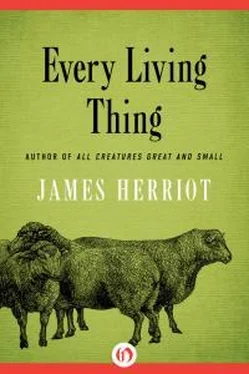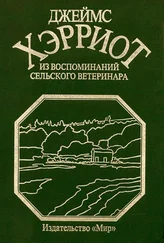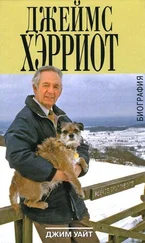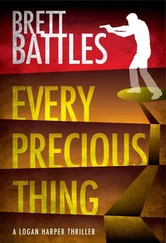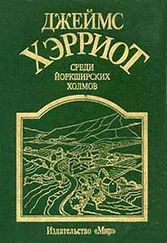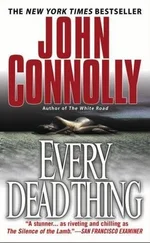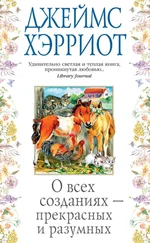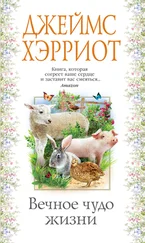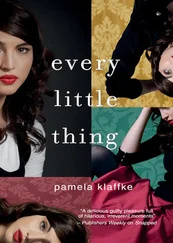Джеймс Хэрриот - Every Living Thing
Здесь есть возможность читать онлайн «Джеймс Хэрриот - Every Living Thing» весь текст электронной книги совершенно бесплатно (целиком полную версию без сокращений). В некоторых случаях можно слушать аудио, скачать через торрент в формате fb2 и присутствует краткое содержание. Год выпуска: 2011, ISBN: 2011, Издательство: Open Road Integrated Media LLC, Жанр: Домашние животные, на английском языке. Описание произведения, (предисловие) а так же отзывы посетителей доступны на портале библиотеки ЛибКат.
- Название:Every Living Thing
- Автор:
- Издательство:Open Road Integrated Media LLC
- Жанр:
- Год:2011
- ISBN:9781453227947
- Рейтинг книги:5 / 5. Голосов: 1
-
Избранное:Добавить в избранное
- Отзывы:
-
Ваша оценка:
- 100
- 1
- 2
- 3
- 4
- 5
Every Living Thing: краткое содержание, описание и аннотация
Предлагаем к чтению аннотацию, описание, краткое содержание или предисловие (зависит от того, что написал сам автор книги «Every Living Thing»). Если вы не нашли необходимую информацию о книге — напишите в комментариях, мы постараемся отыскать её.
Every Living Thing — читать онлайн бесплатно полную книгу (весь текст) целиком
Ниже представлен текст книги, разбитый по страницам. Система сохранения места последней прочитанной страницы, позволяет с удобством читать онлайн бесплатно книгу «Every Living Thing», без необходимости каждый раз заново искать на чём Вы остановились. Поставьте закладку, и сможете в любой момент перейти на страницу, на которой закончили чтение.
Интервал:
Закладка:
We couldn’t wait any longer, and as we got into the car Calum turned to me. “There was something else. When Titch was watering those flowers did you notice anything?”
“Yes. He was cocking his good leg. All his weight was on the bad one.”
“Which means…” said Calum, grinning.
“That he’ll never be lame again.”
“That’s right.” Calum settled behind the wheel and as he started the engine, he sighed contentedly. “Ah, well, some you win.”
Chapter 50
BOB STOCKDALE WAS THE sole survivor of the cataclysm that had struck the Lord Nelson Inn. In dirty wellington boots and flat cap he sat there on a high stool at the end of the bar counter, seemingly oblivious of the endless torrent of piped music and the babel of voices from the jostling pack of smart young people.
I fought my way to the bar, collected a pint of bitter, and as I stood surveying the scene from a space against the wall my thoughts drifted sadly back to the old days. A year ago the Lord Nelson had been a typical Yorkshire country pub. I remembered an evening when I dropped in there with a friend from Glasgow, the city of my youth. There was just one big room then, rather like a large kitchen, with a log fire burning in a black cooking range at one end and a dozen farm men sitting on high-backed oak settles, their pints resting on tables of pitted wood. Those settles were a draught-proof refuge from the cold winds that whistled along the streets of the village outside and over the high pastures where those men spent their days.
The conversation never rose above a gentle murmur, over which the ticking of a wall clock and the click of dominoes added to the atmosphere of rest and quiet.
“Gosh, it’s peaceful in here,” my friend said. Wonderingly he watched the proprietor, in shirt and braces, proceed unhurriedly down to the cellar and emerge with a long enamel jug from which he replenished the glasses, regulating the flow expertly to achieve the required head of froth.
“A bit different from West Nile Street,” I said.
He grinned. “It certainly is. In fact it’s unbelievable. How does a place like this pay? Only a few chaps here, and they aren’t drinking much.”
“I think it hardly pays at all. Maybe a few pounds a week, but the owner has a smallholding—there are cows, calves and pigs just through that wall—and he looks on this as a pleasant sideline.”
My friend took a pull at his glass, stretched out his legs and half closed his eyes. “Anyway, I like it. You can relax here. It’s lovely.”
It was indeed lovely and most of the pubs around Darrowby were still lovely, but as I looked at the modernised Lord Nelson I wondered how long they would stay that way.
When the new owner took over he didn’t waste any time in starting his revolution. He wasn’t a farmer, he was an experienced landlord and he could see rich possibilities in the old inn in the pretty village of Welsby tucked among the fells. The kitchen range disappeared and was replaced by a smart bar counter with a background of mirrors and gleaming bottles; horse brasses, hunting horns and sporting prints appeared on the walls and the antique settles and tables were swept away. The end wall was knocked down and people ate in an elegant dining room where once I calved the cows and tended the pigs.
Two things happened almost at once; droves of young people swarmed out in their cars from the big Yorkshire towns and the old clientele melted away. I never knew where those farm men went—probably to pubs in the neighbouring villages—but Bob Stockdale stayed. I couldn’t understand why, but he was a quiet man, a bit of a loner, and maybe he felt that he had sat in that room several nights a week for years and, despite all the changes, he didn’t want to leave it. Anyway, whenever I called in he was there, perched on the same stool, with his old bitch, Meg, tucked underneath. Welsby was part of the long, long road up the dale, which I had travelled a thousand times, and when I had a night call up there I sometimes dropped in for a beer. Tonight I had replaced a prolapsed uterus in a cow, and as I sipped at my glass I had the warm feeling of satisfaction after a successful operation.
I spotted a gap in the crush round the bar and pushed my way to Bob’s side. “Hello, Bob,” I said. “Can I top up your glass? It’s getting a bit low.”
“Aye, thank ye, Mr. Herriot. It’s gettin’ far down, right enough.” He drained the last few inches and pushed the glass across the counter.
He spoke slowly, articulating with care. It was nearing closing time and he would have been there a long time, quietly lowering the pints. He had reached a state of detachment from the world that I had seen before.
I looked down at Meg’s nose protruding from between the legs of the stool and bent down to stroke the greying muzzle of the old bitch who was Bob’s helper and friend. By day she brought the cows in for him, skirting eagerly around them, nipping at their heels if they strayed, and in the evenings they relaxed together.
I looked at the growing opacity in the friendly eyes. “She’s getting on a bit now, Bob.”
“Aye, she’ll be ten come Easter, but she’s still right active.”
“Oh yes, I’ve seen her at work. She’ll go on for a long time yet.”
He nodded solemnly.
We talked for a few minutes. I had a great fellow feeling for men like Bob, the hardy farm workers who were part of my life—catching and holding the big beasts for me, sweating side by side with me at tough calvings and lambings. It was a pleasure to be able to meet them off the job, and I could see that Bob was enjoying our reminiscing together. He smiled gently at the memories, even though his speech was slurring and his eyes half closed.
I finished my drink and looked at my watch. “Got to go now, Bob. Take care of yourself till I see you again.”
In reply he slid off the stool. “Ah’m off ’ome, too.” He tacked his way carefully to the door.
Outside in the summer dusk, he went over to his bicycle, which was resting against the wall. I paused by my car. I had seen this ritual before and found it fascinating.
He pulled the bike from the wall and took some time about lining it up to his satisfaction, then he made an attempt to throw a wellingtoned leg over the saddle. He didn’t make it the first time and stood for a few seconds apparently breathing deeply, then with great care he got the bike into position before jerking his leg up again. Once more he missed and I thought for a moment that he was going to finish up, bike and all, on the ground, but he regained his balance and stood with bowed head, communing with himself. Then he squared his shoulders decisively, peered along crossbar and handlebars, and this time with a convulsive leap he landed in the saddle.
For a tense period he sat there, moving only a few inches forward, feet working on the pedals, hands pulling the handlebars from side to side in his struggle to stay upright. Then at last he took off and began to move an inch at a time, almost imperceptibly, along the road. After a few yards he stopped and was stationary for several seconds, keeping the bike vertical by some mystical means. I thought, not for the first time, that it was a pity that Bob had never entered for the annual slow bicycle race at Darrowby Gala. He would have carried the prize off every year.
Leaning on my car, I watched his progress. Old Meg, obviously familiar with the routine, stepped along patiently by his side, dropping on her chest whenever he carried out one of his miraculously balanced pauses. Bob’s cottage was about a mile along the road and I wondered how long it would take him to get there. His erstwhile companions before the old pub was modernised were always adamant that he never ever fell off and I personally had never seen him come to grief. When man and dog finally disappeared in the growing darkness I got into my car and drove home.
Читать дальшеИнтервал:
Закладка:
Похожие книги на «Every Living Thing»
Представляем Вашему вниманию похожие книги на «Every Living Thing» списком для выбора. Мы отобрали схожую по названию и смыслу литературу в надежде предоставить читателям больше вариантов отыскать новые, интересные, ещё непрочитанные произведения.
Обсуждение, отзывы о книге «Every Living Thing» и просто собственные мнения читателей. Оставьте ваши комментарии, напишите, что Вы думаете о произведении, его смысле или главных героях. Укажите что конкретно понравилось, а что нет, и почему Вы так считаете.
